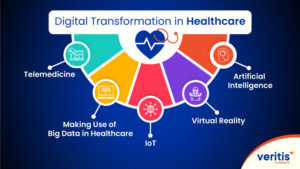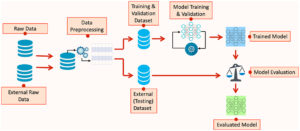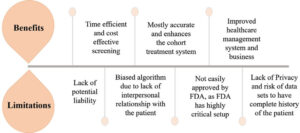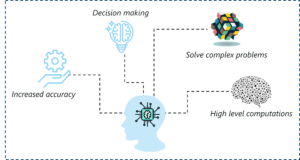The healthcare industry is undergoing a profound digital transformation, driven largely by advancements in Artificial Intelligence (AI). AI technologies are reshaping how healthcare providers deliver care, manage data, and interact with patients. This transformation is not just about incorporating new technologies but about fundamentally rethinking and improving the delivery of healthcare services. AI’s influence on this evolution is multifaceted, impacting everything from diagnostics and treatment planning to patient engagement and administrative efficiency.
Revolutionizing Diagnostics and Treatment
AI is revolutionizing diagnostics by enhancing the accuracy and speed with which medical conditions are identified. Traditional diagnostic methods often rely on the interpretation of imaging studies, lab results, and clinical symptoms, which can be time-consuming and subject to human error. AI algorithms, particularly those based on deep learning, can analyze medical images with remarkable precision, identifying patterns and anomalies that may elude human eyes. For instance, AI systems are now used to detect early signs of diseases such as cancer, cardiovascular conditions, and neurological disorders through analysis of X-rays, MRIs, and CT scans.
In addition to improving diagnostic accuracy, AI is transforming treatment planning. Machine learning models can predict how individual patients will respond to different treatments based on their medical history, genetic information, and lifestyle factors. This allows for more personalized and effective treatment plans tailored to each patient’s unique needs. For example, AI can analyze a patient’s genetic profile to recommend targeted therapies for cancer, improving treatment outcomes and minimizing side effects. By integrating AI into clinical workflows, healthcare providers can make more informed decisions, optimize treatment strategies, and ultimately enhance patient care.
Enhancing Patient Engagement and Experience
AI is also playing a crucial role in improving patient engagement and overall experience. Patient engagement is a key factor in achieving positive health outcomes, and AI-driven tools are helping to bridge the gap between patients and their healthcare providers. Virtual health assistants and chatbots powered by AI can provide patients with timely information, answer questions, and offer support for managing their health conditions. These digital tools are available 24/7, allowing patients to access information and assistance whenever they need it.
AI-powered platforms also facilitate personalized communication by analyzing patient data to tailor interactions and recommendations. For instance, AI can send customized reminders for medication, follow-up appointments, and lifestyle changes based on individual health data. This level of personalization not only enhances patient adherence to treatment plans but also improves overall satisfaction with the healthcare experience. By leveraging AI to foster better communication and engagement, healthcare providers can create more patient-centered care models that support better health outcomes.
Optimizing Administrative Efficiency
Administrative tasks in healthcare, such as scheduling, billing, and documentation, can be time-consuming and prone to errors. AI is streamlining these processes, leading to significant improvements in operational efficiency. Automated scheduling systems powered by AI can manage appointments, optimize schedules, and reduce no-show rates by sending reminders and rescheduling missed appointments. This helps to maximize the use of available resources and improve patient access to care.
AI is also transforming the billing and coding processes by automating the capture and processing of data, reducing the likelihood of errors, and ensuring accurate reimbursements. Machine learning algorithms can analyze patient records and generate accurate billing codes, minimizing the administrative burden on healthcare staff. This not only improves the efficiency of billing processes but also accelerates the reimbursement cycle, ensuring that healthcare organizations receive timely payments for their services.
Advancing Research and Innovation
AI is driving significant advancements in medical research and innovation by providing researchers with powerful tools to analyze complex datasets. In drug discovery, AI algorithms can analyze molecular data to identify potential drug candidates and predict their effectiveness. This accelerates the development of new therapies and reduces the time and cost associated with bringing new drugs to market.
AI is also enhancing the design and execution of clinical trials. Machine learning models can identify suitable candidates for trials based on a range of factors, including genetic information and medical history. This improves the efficiency of recruiting participants and ensures that clinical trials are conducted with the right populations. Additionally, AI can monitor trial progress, analyze data in real time, and provide insights that support better decision-making and faster adjustments to study protocols.
Improving Population Health Management
Population health management is a critical aspect of modern healthcare, focusing on improving the health outcomes of entire communities. AI plays a significant role in this area by analyzing large datasets to identify trends, predict health risks, and develop targeted interventions. For example, AI can analyze data from electronic health records, social determinants of health, and other sources to identify at-risk populations and recommend preventive measures.
AI-driven predictive models can forecast disease outbreaks, track the spread of infectious diseases, and guide public health responses. By leveraging these insights, healthcare organizations and policymakers can implement effective strategies to address health challenges and improve overall community health. AI’s ability to analyze and interpret complex data enables more proactive and evidence-based approaches to population health management.
Addressing Challenges and Ethical Considerations
While AI offers numerous benefits in the digital transformation of healthcare, it also presents challenges and ethical considerations. Data privacy and security are paramount concerns, as the integration of AI involves handling sensitive patient information. Ensuring robust data protection measures and complying with regulations such as the Health Insurance Portability and Accountability Act (HIPAA) is essential to maintaining patient trust.
Additionally, the use of AI in healthcare must address issues related to algorithmic bias and fairness. AI models are trained on data that may reflect existing biases, which can lead to disparities in care. It is crucial to develop and implement AI systems that are transparent, fair, and designed to mitigate biases to ensure equitable healthcare outcomes for all patients.
Conclusion
AI is at the forefront of the digital transformation in healthcare, offering a range of benefits that enhance diagnostics, treatment, patient engagement, and operational efficiency. By integrating AI into healthcare systems, providers can achieve more personalized care, streamline administrative processes, and drive innovation in research and population health management. However, the successful adoption of AI requires addressing challenges related to data privacy, security, and fairness. As AI technology continues to evolve, its role in shaping the future of healthcare will become increasingly central, driving improvements in care delivery and patient outcomes across the globe.





